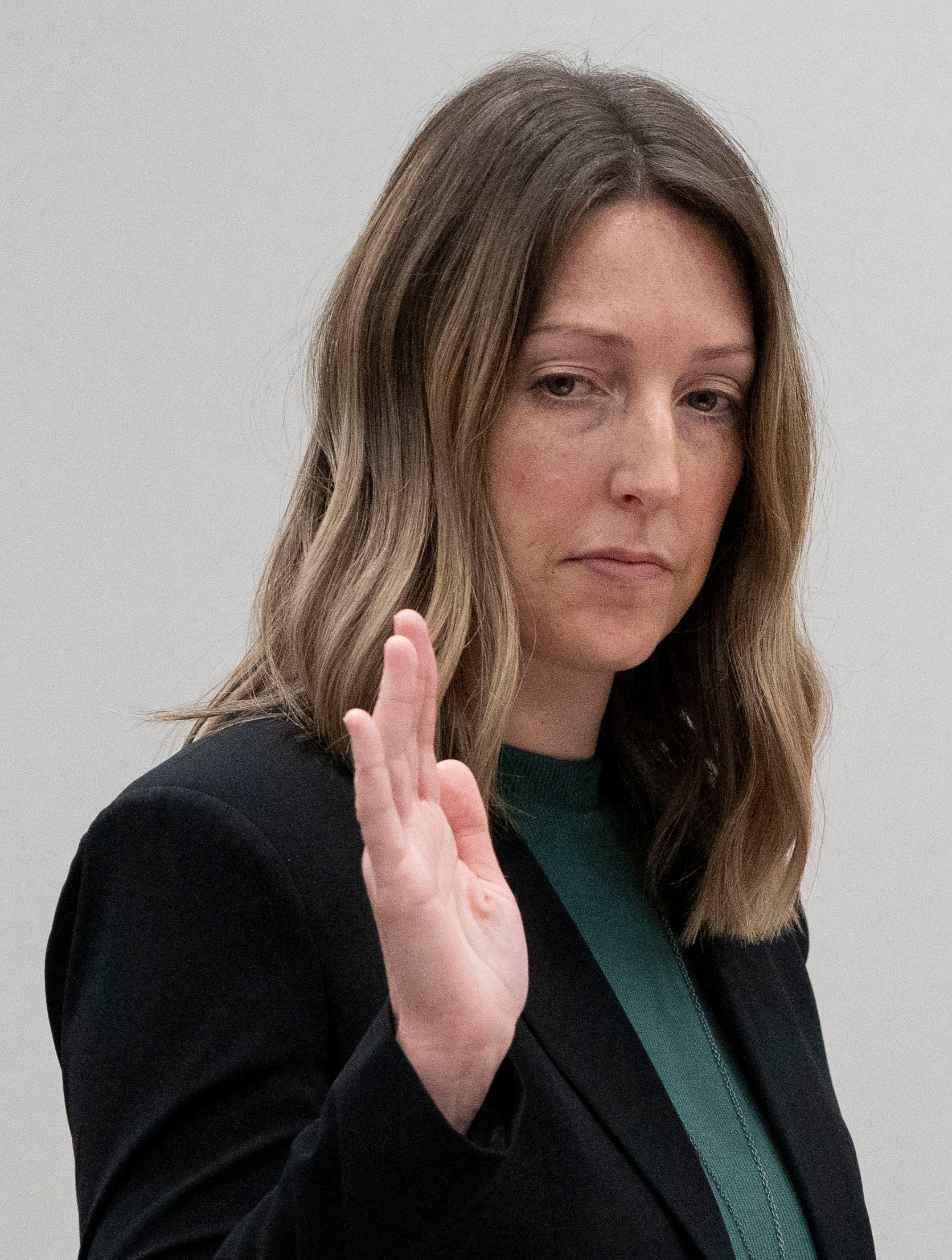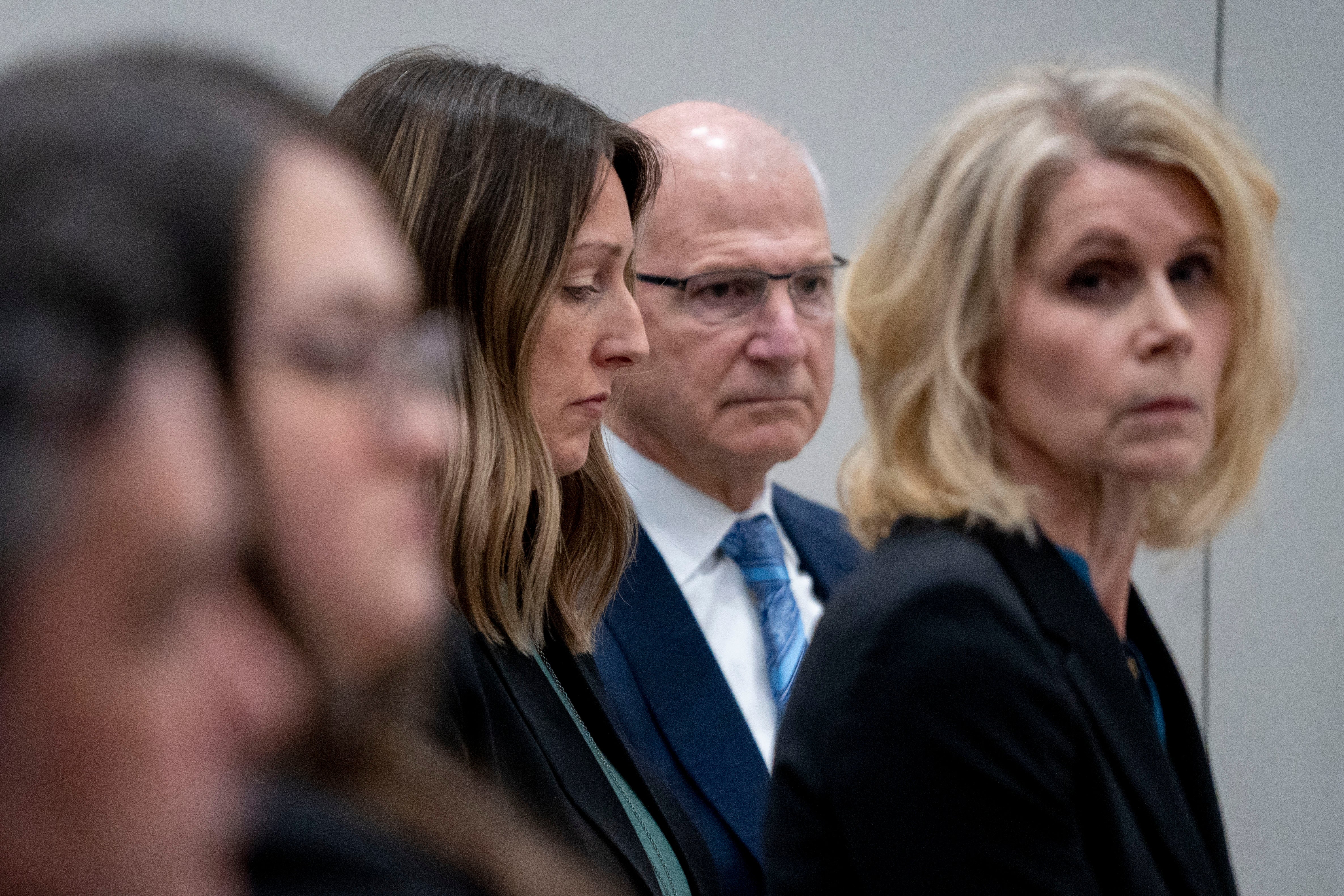
Nearly one year after she publicly discussed the case of a 10-year-old rape survivor’s abortion, an Indiana obstetrician-gynecologist at the centre of anti-abortion Republican backlash has been reprimanded by a state medical board.
On 25 May, Indiana’s Medical Licensing Board determined that Dr Caitlin Bernard – who provided care for the 10-year-old patient who traveled from Ohio to obtain legal access to abortion – had violated patient privacy laws by speaking to a reporter about the case.
Dr Bernard faces a letter of reprimand and a $3,000 fine.
After the US Supreme Court overturned Roe v Wade on 24 June of last year, officials in Ohio – among several states that do not provide any exceptions for abortions from pregnancies resulting from rape or incest – moved quickly to outlaw abortion at roughly six weeks of pregnancy.
Roughly one week later, a 10-year-old girl and her mother traveled from Ohio to Indiana to seek abortion care, Dr Bernard told the Indianapolis Star during an abortion rights rally. The story became an instant political lightning rod, with abortion rights advocates pointing to the case to underscore the implications of sweeping bans on care, while right-wing pundits and officials falsely dismissed it as a hoax.
The case was picked up by national and international news outlets, evidence of the far-reaching impacts of anti-abortion laws and potential legal minefields facing providers and their urgent healthcare decisions. After Ohio’s law went into effect, state lawmakers in Indiana passed a similar measure banning all abortions at any stage of pregnancy. That law is currently held up by a legal challenge.
Dr Bernard quickly came under scrutiny of right-wing media figures and GOP officials who falsely suggested that the crime against the 10-year-old girl was fake, demanded to see criminal and medical records, and fuelled a barrage of attacks baselessly accusing the doctor of failing to notify law enforcement about her patient’s case.
During an appearance on Fox News that month, Indiana’s Republican Attorney General Todd Rokita called Dr Bernard “an abortion activist acting as a doctor”. He later issued subpoenas to doctors and healthcare facilities seeking medical records relating to the patient.
At a 14-hour hearing that ended late on Thursday night, Dr Bernard’s lawyers argued that she properly reported the incident to authorities and did violate patient privacy laws when she discussed the case in a generalized anecdote that did not identify anyone involved.
Records and testimony have shown that the case was reported to state agencies as required under law.
Throughout the last year, in cases stemming from the story of the 10-year-old patient, attorneys for Dr Bernard have lambasted the attorney general’s legal campaign as baseless and politically motivated.
“Dr Bernard could not have anticipated the atypical and intense scrutiny that this story received,” Alice Morical, an attorney for the doctor, told the board during the hearing.

“She did not expect that the politicians would say that she made the story up. She did not expect that people would say that the reporter didn’t have sufficient information. The politicalisation of this [is] what caused this issue to continue to grow and be a focus,” she argued.
Dr Bernard, who also spoke to The Independent about the consequences of abortion bans in the wake of the Supreme Court’s decision to revoke a constitutional right to care, told the panel that she had an “obligation” as a health provider to ensure patients and others in the state could be impacted.
“I don’t think that anybody would have been looking into this story as any different than any other interview that I’ve ever given if it was not politicised the way that it was by public figures in our state and in Ohio,” she said.
“I think that it’s incredibly important for people to understand the real world impacts of the laws of this country about abortion or otherwise,” she added. “I think it’s important for people to know what patients will have to go through because of legislation that is being passed. And a hypothetical does not make that impact. It does not help people understand what is happening.”
Under questioning from the legal team for the attorney general, who accused her of advancing a political agenda, she replied: “I don’t consider that to be a political agenda at all in my estimation, as I think it is the same for all physicians, abortion is not a political issue.”
“Abortion is part of comprehensive reproductive health care and needs to stay squarely in the realm of reproductive health,” she added.

Dr Bernard’s employer, Indiana University Health, also found that she did not violate rules under the Health Insurance Portability and Accountability Act, or HIPAA. And an expert on HIPAA law told the panel on 25 May that the information she had shared – “age, gender and state” – is “not protected health information,” and that “there was nothing that was individually identifiable.”
The board ultimately determined that Dr Bernard did not fail to report child abuse, as Republican officials had claimed.
“The Medical Licensing Board exonerated Dr Bernard on Attorney General Rokita’s most serious and completely unsubstantiated claims,” according to a statement from Ms Morical and Dr Bernard’s legal team.
“While we wholeheartedly disagree with the letter of reprimand on privacy issues, we are proud of Dr Bernard for standing up for access to compassionate medical care and for her consummate professionalism during these unprecedented proceedings,” the statement added.
A statement from Mr Rokita following the hearing praised the board’s decision.
“Like we have said for a year, this case was about patient privacy and the trust between the doctor and patient that was broken,” he said.
In December, an Indiana judge denied Dr Bernard’s request to block the attorney general’s efforts, arguing that the matter was for the state licensing board, not the courts, to decide.
But the judge also said that Mr Rokita acted unlawfully with his volatile public comments about Dr Bernard with allegations of wrongdoing, in violation of his office’s confidentiality requirements.
Mr Rokita caused “irreparable harm” to her reputation with his “unlawful breaches” of confidentiality provisions after he discussed his investigation on national news and in the press, according to Judge Heather Welch.
The man accused of raping the 10-year-old girl was arrested last year. Police claim that Gerson Fuentes has confessed at least twice, and detectives have also testified that his DNA matches genetic material collected at the clinic where she received care. He has pleaded not guilty. A trial is expected to begin later this year.







